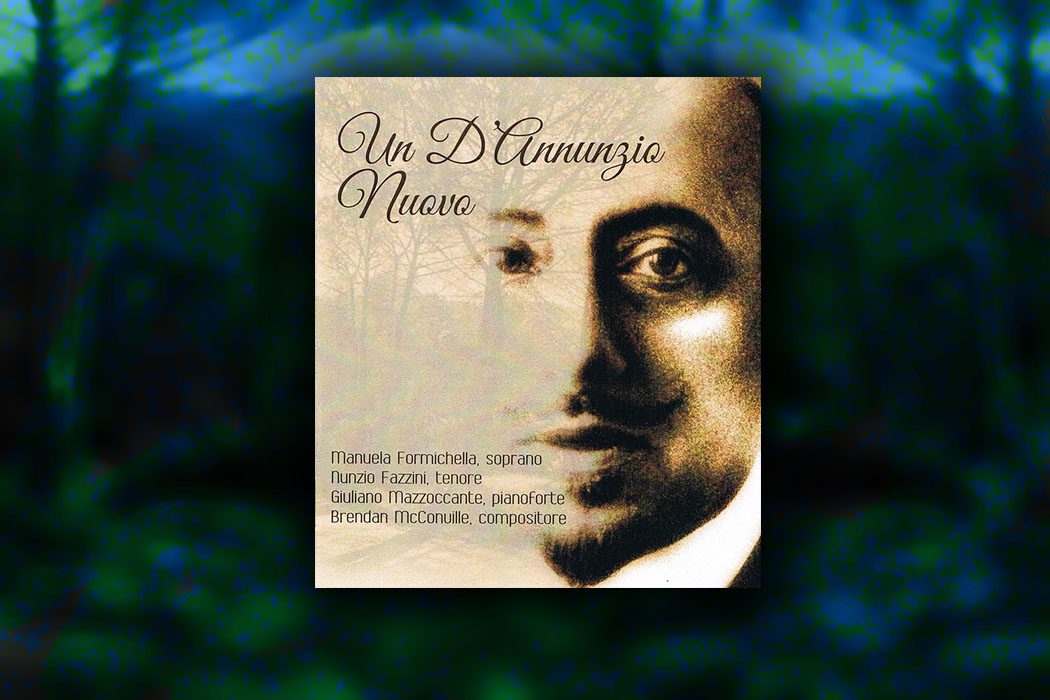Competing pleasures confront the listener in Un D’Annunzio Nuovo, a recent recording of music by Brendan McConville based on the poetry of Gabriele D’Annunzio, the inarguably multi-faceted Italian poet and novelist of the late 19th and early 20th centuries. On one hand, the charm of D’Annunzio’s work inspires an exploration of the poet’s colorful life that took him from a multi-genre literary figure, to military hero in World War I, to political leader in the war’s aftermath. On the other hand, listeners can not escape McConville’s evocative and seductive treatment of tonality—both melodic and atmospheric—that lovingly supports and amplifies the D’Annunzio lyrics.
 “Evocative” is the operative word in the opening work on the recording, the four stanza La Pioggia nel Pineto (The Rain in the Pine Forest), based on D’Annunzio’s 1902 poem and conceived for soprano, tenor, and piano, woven together with a fabric of environmental background sounds recorded by McConville. In the first stanza “Toci” (“Hush”), the listener is immediately drawn into that landscape of sound—birds and wind that give way to thunder foreshadowed by bass notes from the piano. Rain begins to fall and we discover the poet walking in a pine forest with a companion (Hermione).
“Evocative” is the operative word in the opening work on the recording, the four stanza La Pioggia nel Pineto (The Rain in the Pine Forest), based on D’Annunzio’s 1902 poem and conceived for soprano, tenor, and piano, woven together with a fabric of environmental background sounds recorded by McConville. In the first stanza “Toci” (“Hush”), the listener is immediately drawn into that landscape of sound—birds and wind that give way to thunder foreshadowed by bass notes from the piano. Rain begins to fall and we discover the poet walking in a pine forest with a companion (Hermione).
Overtaken by the rain, the poet and companion find themselves drawn into a lyrical naturalism of earthy sensuality. McConville allows his vocal writing sung by tenor Nuncio Fazzini and soprano Manuela Formichella to ebb and flow organically with the underlying piano passages (pianist Giuliano Mazzoccante). Both vocal lines and piano are all enticingly punctuated by thunder and other sounds manipulated by electronics, including what appears to be vocal lines transformed by a vocoder. Such transformations are accomplished judiciously and subtly, always in support of the poetic flow.
The third stanza “Ascolta” (“Listen”) features Formichella and a quasi-fugue of piano and electronic atmosphere. It is in this stanza that McConville reveals his most captivating and dramatic lyrical writing for the voice. As Formichella’s lyrical clarity is joined by Fazzini’s warmth, the spirit of the piece embraces the dramatic and sensual. In the fourth stanza, “Piove”, McConville’s piano turns to illustration of a metaphor for sexuality and the listener discovers the pair’s transformation by the rain into elements of the forest.
…Now joined together and now apart
(and the rude green vigor entwines our ankles entangles our knees)
who knows where, who knows where?
And it’s raining on our faces
sylvan,
Its raining our our hands
naked,
on our clothes
thin,
on the fresh thoughts
which the soul uncovers
in newness,
On the lovely fable
that yesterday
beguiled me, and today beguiles you,
O Hermione.
Also included on the recording are two other tracks given musical breath and substance by McConville: Vorrei for soprano and piano, and La Meditazione del Merlo for flute (Sacha de Ritis) and piano (Michela de Amicis). The latter was inspired by the flight of blackbirds witnessed by McConville while recording the natural sounds for La Pioggia nel Pineto.

McConville, an Associate Professor at the University of Tennessee School of Music, was introduced to the work of D’Annunzio by his wife, Annachiara Mariani, a native of the Abruzzo region of southern Italy. (Mariani is an assistant professor of Italian in the Department of Foreign Languages at UT.) McConville’s recording of Un D’Annunzio Nuovo came about as a result of six months he spent as a Fulbright Scholar in 2016 immersed in teaching and research at the Luisa D’Annunzio Conservatory of Music in Pescara, Italy.
CD: Un D’Annunzio Nuovo (Wide Classique, 2018, WCL 170)
Spotify: https://open.spotify.com/album/2dV36wdIBidgJkV3P6ZnUo
iTunes: https://itunes.apple.com/us/album/un-dannunzio-nuovo/1436190393
On Amazon around the world (Italy, France, Germany, Japan, etc.), and most other major music subscription outlets.







